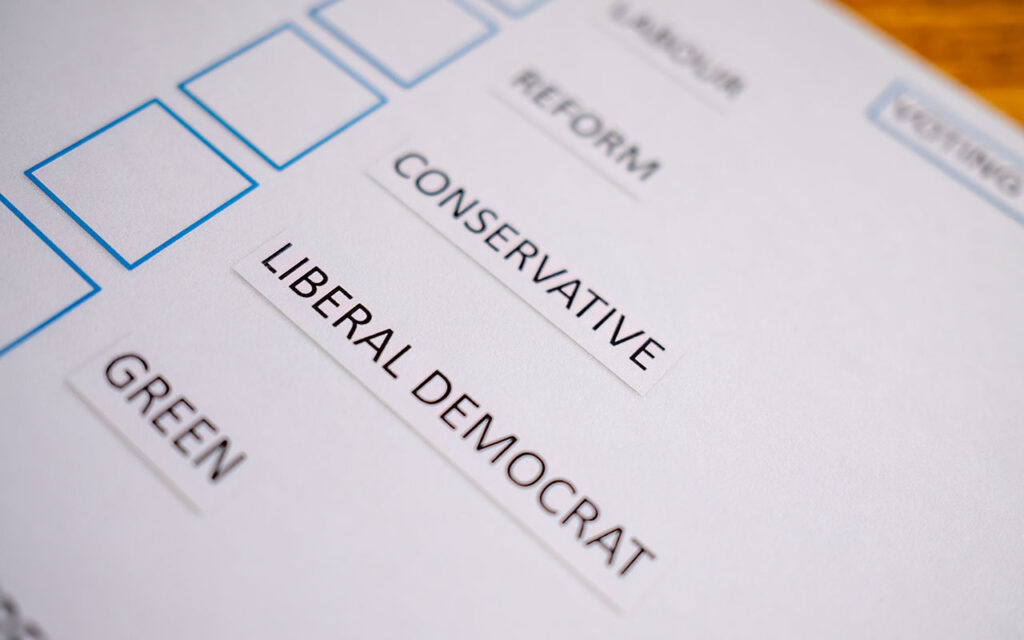Party conference season, the staple of the political calendar, is over for another year. So, how did the main parties fare?
While it seems a distant memory now, first out the trap was Reform UK in Birmingham. Putting Jeremy Kyle and the slick Saturday night TV show vibe to one side, the takeaway was the mood of the people who were there.
It was less a feeling of anger and more a sense of optimism and excitement to be a part of the Reform movement, with members really buying into the mantra that Reform represents ‘our last hope’.
However, the conference didn’t come without its own quirks, particularly with Angela Rayner’s resignation and the government reshuffle stealing the limelight.
Nigel Farage ended up performing to a half-empty hall, with most political journalists already back reporting from Downing Street. The speech, meant to strike an upbeat tone celebrating Reform’s achievements, faced criticism for a lack of substance. Despite all this, Reform came away upbeat and confident that the momentum is on its side to win the next election.
The showbiz of Birmingham was quickly followed by more sedate seaside scenes with the Liberal Democrats in Bournemouth. Lib Dem members were still jubilant about their general election victory and 72 MPs.
The irony, however, was that while members felt frustrated that the media were focusing on Reform rather than them, Ed Davey positioned his whole 55-minute leader’s speech on combating Farage, mentioning him 30 times.
By contrast Labour, the party in government, got 10 mentions. He wanted to take the fight directly to Reform, making out that the choice was now between him and the Liberal Democrats, or Mr Farage.
Leadership battles
Next up was Liverpool for Labour’s annual bash. The surprise was that it was broadly an upbeat affair, with little real acknowledgement of the party’s tanking status in the polls or challenges with the Budget.
The prime minister went into this conference fighting for his leadership, with visible anger over several policies and a blatant leadership challenge from Manchester mayor Andy Burnham.
However, the PM’s speech went down well with the party faithful, with a noticeable shift in approach to focus on the traditional wing of the party. If the objective of the conference was to save the PM, I would say this was mission accomplished.
The new Defra secretary of state was very present and clearly pleased to be in the new job. She spoke of her desire to reset the relationship with the farming community, delivering the 25-year farming road map and responding to the farming profitability review.
The new minister, Angela Eagle, reiterated that she is in listening mode and keen to hear from the sector. I was pleased to have a few minutes with her and reiterated the NPA’s ambition to be a supportive partner to the government.
To round things off, the Conservatives were back in Manchester for what most would consider a flat affair with a lot less corporate sponsorship and presence than in previous years.
Kemi Badenoch was also heading into this conference fighting for her leadership, and, likewise, came out the other side in a stronger position following her well-received conference speech and subsequent strong performances at PMQs.
However, this could all be too little too, as the recent anniversary of her leadership marks the point at which she can now be formally challenged. Recent polls shows 50% of members don’t think she should lead the party into the next election.
How do things look?
These conferences matter. So how do things look now we are out the other side? Well, the short answer is next to nothing has changed.
The first poll following the party conferences had Reform unchanged on 27%, Labour unchanged on 20%, the Conservatives unchanged on 17%, and the Lib Dems down 1 on 16%. The only party to have seen a positive bounce was the Green Party, up 1% to 13% under its new leader, Zack Polanski.
Unfortunately, for the two main parties, the pain doesn’t look set to stop here.
Attention has quickly shifted to the Autumn Budget and how the chancellor will fill the £20-£30bn black hole and bring an end to the so-called ‘doom loop’.
With tax rises and spending cuts almost inevitable, all eyes will be on No 11 in the run-up to November 26.
The other biggie coming down the track is the May local elections in all London boroughs and across England, as well as elections to the Scottish Parliament and Senedd.
Labour and the Conservatives are set for big losses. Welsh Labour is expected to perform particularly badly in the Senedd elections, and, if the recent Caerphilly by-election is anything to go by, could potentially lose control of the Welsh Government for the first time.
Should this come to be, we may well be heading into the middle of next year with leadership elections once again taking place for both Labour and the Conservatives.




